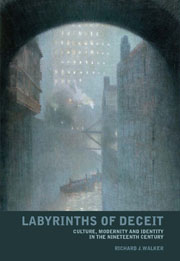Book contents
- Frontmatter
- Contents
- Acknowledgements
- Introduction: Tracing the fragments of modernity
- Part I (De)Generating doubles: duality and the split personality in the prose writing of James Hogg, Robert Louis Stevenson and Oscar Wilde
- Part II The stripping of the halo: religion and identity in the poetry of Alfred Tennyson, James ‘B. V.’ Thomson and Gerard Manley Hopkins
- Part III Infected ecstasy: addiction and modernity in the work of Thomas De Quincey, Alfred Tennyson, Christina Rossetti and Bram Stoker
- Introduction
- 8 A change in physical economy: Thomas De Quincey's confession
- 9 Coming like ghosts to trouble joy: Alfred Tennyson's ‘The Lotos Eaters’
- 10 Like honey to the throat but poison to the blood: Christina Rossetti's addictive market
- 11 The blood is the life: Bram Stoker's infected capital
- Conclusion: Ghost-script
- Notes
- Bibliography
- Index
10 - Like honey to the throat but poison to the blood: Christina Rossetti's addictive market
from Part III - Infected ecstasy: addiction and modernity in the work of Thomas De Quincey, Alfred Tennyson, Christina Rossetti and Bram Stoker
- Frontmatter
- Contents
- Acknowledgements
- Introduction: Tracing the fragments of modernity
- Part I (De)Generating doubles: duality and the split personality in the prose writing of James Hogg, Robert Louis Stevenson and Oscar Wilde
- Part II The stripping of the halo: religion and identity in the poetry of Alfred Tennyson, James ‘B. V.’ Thomson and Gerard Manley Hopkins
- Part III Infected ecstasy: addiction and modernity in the work of Thomas De Quincey, Alfred Tennyson, Christina Rossetti and Bram Stoker
- Introduction
- 8 A change in physical economy: Thomas De Quincey's confession
- 9 Coming like ghosts to trouble joy: Alfred Tennyson's ‘The Lotos Eaters’
- 10 Like honey to the throat but poison to the blood: Christina Rossetti's addictive market
- 11 The blood is the life: Bram Stoker's infected capital
- Conclusion: Ghost-script
- Notes
- Bibliography
- Index
Summary
Please give my love to Lucy; and explain that I was on my way to say goodbye when the door at which I was presenting myself shut, and shut me out: I dare say she detects that I am sufficiently shy to lose heart under such a rebuff. The ‘at home’ seemed to me very successful, and I only regret not having had a glimpse of your library. What a beautiful stair carpet!
Much recent criticism of Christina Rossetti's poetry has tended to rely upon biographical material to support readings of her work. Her devotional verse in particular, with its themes of renunciation and selfsacrifice balanced by the articulation of frustration and inward tension, seems to lend itself to biographical interpretations. The details of her life – taking into consideration her association with the Pre-Raphaelite Brotherhood, her aborted engagements, and her acute, even masochistic religious faith, which seems to have accounted for her apparently frustrated love life – do indeed provide a provocative insight into her distinctive poetic practice. In addition the internal conflicts between conceptions of the self as poet and woman (compounded by the nature of Rossetti's strict religious discipline) in the nineteenth century, has fuelled much feminist criticism of Victorian women's writing; paraphrasing much of this debate, Kathleen Jones, in her biography of Rossetti, states that feminist criticism views her craft as the ‘articulation of the struggle for a voice within a creed which consistently denied it to her’ and one where, in terms of this struggle, ‘the existence of religious ritual, conformity and submission … won’.
- Type
- Chapter
- Information
- Labyrinths of DeceitCulture, Modernity and Identity in the Nineteenth Century, pp. 243 - 255Publisher: Liverpool University PressPrint publication year: 2008



